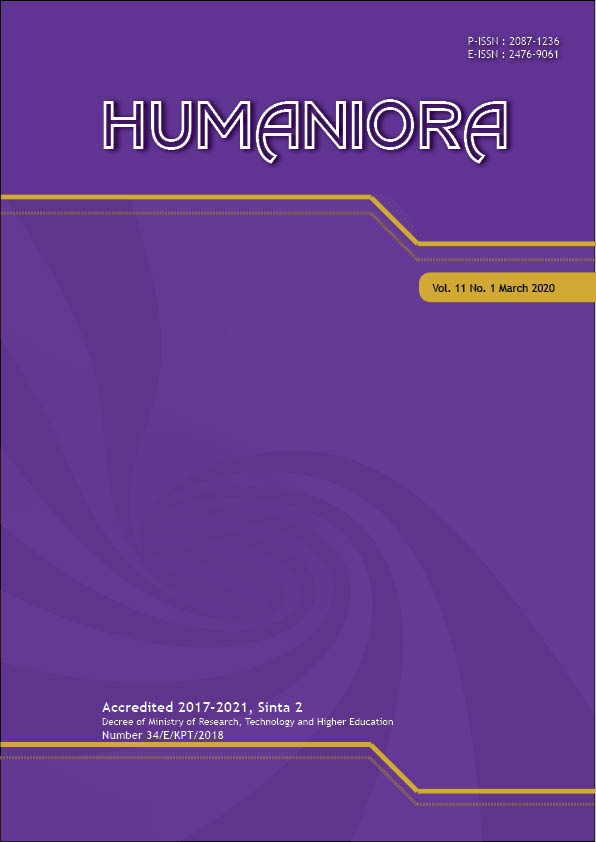Reflection on Technology-Enhanced Learning in Research Based Teaching Method Implementation
DOI:
https://doi.org/10.21512/humaniora.v11i1.6363Keywords:
Technology-Enhanced Learning (TEL), research-based teaching method, English language teachingAbstract
The research aimed to investigate the utilization of technological tools in implementing the research-based teaching method in English for Academic Writing Course. The narrative research design was implemented to reach the conclusion of the research. 66 (sixty-six) students enrolled in English for Academic Writing Course were observed. Lecturer’s reflective journal and portfolios were analyzed. An online interview was conducted to confirm the initial findings. There were six technological tools and applications utilized during the preparation process, instruction, and practice process, as well as in the assessment and transfer process. Through a structured reflection process based on Gibbs’ model of reflection, the result shows that the students’ motivation is increased during the use of technology. Technology also enables students to work collaboratively. Nevertheless, preparation and briefing are needed to be done before the class begins. Like the classic problem of technology implementation, internet access becomes the main challenge in conducting Technology-Enhanced Learning (TEL) in the classroom.
References
Ahn, J., & Clegg, T. (2017). Human-computer interaction and education: Designing for technology-enhanced learning experiences. The Wiley Handbook of Human Computer Interaction Set, 2, 821–830. https://doi.org/10.1002/9781118976005.ch38.
Ajayi, L. (2016). How intern teachers use classroom video for self-reflection on teaching. Educational Forum, 80(1), 79–94. https://doi.org/10.1080/00131725.2015.1102365.
Andujar, A., Salaberri-Ramiro, M. S., & MartÃnez, M. S. C. (2020). Integrating flipped foreign language learning through mobile devices: Technology acceptance and flipped learning experience. Sustainability, 12(3), 1-12. https://doi.org/10.3390/su12031110.
Ansori, M., & Nafi, N. N. (2018). English teachers’ perceived benefits and challenges of flipped classroom implementation. Journal of English Education and Linguistics Studies, 5, 211–227.
Armstrong, E. J. (2019). Maximising motivators for technology-enhanced learning for further education teachers: Moving beyond the early adopters in a time of austerity. Research in Learning Technology, 27, 1-23. https://doi.org/10.25304/rlt.v27.2032.
Brewer, R., & Movahedazarhouligh, S. (2019). Flipped learning in flipped classrooms: A new pathway to prepare future special educators. Journal of Digital Learning in Teacher Education, 35(3), 128–143. https://doi.org/10.1080/21532974.2019.1619110.
Buchal, R., & Songsore, E. (2019). Using Microsoft Teams to support collaborative knowledge building in the context of sustainability assessment. Proceedings of the Canadian Engineering Education Association (CEEA), 19, 1–8. https://doi.org/10.24908/pceea.vi0.13882.
Carl, A., & Strydom, S. (2017). E-portfolio as reflection tool during teaching practice: The interplay between contextual and dispositional variables. South African Journal of Education, 37(1), 1–10. https://doi.org/10.15700/saje.v37n1a1250.
Creswell, J. W. (2012). Educational research: Planning, conducting, and evaluating quantitative and qualitative research. Boston: Pearson Education Inc.
Daniela, L., Visvizi, A., Gutiérrez-Braojos, C., & Lytras, M. D. (2018). Sustainable higher education and Technology-Enhanced Learning (TEL). Sustainability (Switzerland), 10(11), 1–22. https://doi.org/10.3390/su10113883.
Dunn, T. J., & Kennedy, M. (2019). Technology Enhanced Learning in higher education; Motivations, engagement, and academic achievement. Computers and Education, 137, 104–113. https://doi.org/10.1016/j.compedu.2019.04.004.
Lee, K. Y., & Lai, Y. C. (2017). Facilitating higher-order thinking with the flipped classroom model: A student teacher’s experience in a Hong Kong secondary school. Research and Practice in Technology Enhanced Learning, 12(1), 1-14. https://doi.org/10.1186/s41039-017-0048-6.
Martin, L., & Tapp, D. (2019). Teaching with teams: An introduction to teaching an undergraduate law module using Microsoft Teams. Innovative Practice in Higher Education, 3(3), 58–66.
McGregor, D., & Cartwright, L. (2011). Developing reflective practice: A guide for beginning teachers. Berkshire: Open University Press.
McLaughlin, J. E., White, P. J., Khanova, J., & Yuriev, E. (2016). Flipped classroom implementation: A case report of two higher education institutions in the United States and Australia. Computers in the Schools, 33(1), 24–37. https://doi.org/10.1080/07380569.2016.1137734.
Nurfaidah, S., Lengkanawati, N. S., & Sukyadi, D. (2017). Levels of reflection in EFL pre-service teachers` teaching journal. Indonesian Journal of Applied Linguistics, 6(1), 135–144. https://doi.org/10.17509/ijal.v2i2.167.
Pechenkina, E., & Aeschliman, C. (2017). What do students want? Making sense of student preferences in technology-enhanced learning. Contemporary Educational Technology, 8(1), 26–39.
Putri, M. R. (2019). Promoting 21st century skills for facing industry 4.0 in English for Written Business Communication Course: Students’ perception. In Proceedings of the 3rd English Language and Literature International Conference, ELLiC. Semarang, Indonesia. https://doi.org/10.4108/eai.27-4-2019.2285326.
Ratnam, K. A., & Su, I. (2017). Innovating teaching & learning practices with technology integration frameworks: A case on Asia Pacific University of Technology & Innovation on the adoption of Office 365 education platform & cortana intelligence suite for education. Proceedings of Microsoft Academic Conference for Higher Education 2017, 8(1), 18–21.
Stenberg, K., Rajala, A., & Hilppo, J. (2016). Fostering theory–practice reflection in teaching practicums. Asia-Pacific Journal of Teacher Education, 44(5), 470–485. https://doi.org/10.1080/1359866X.2015.1136406.
Visvizi, A., & Daniela, L. (2019). Technology-enhanced learning and the pursuit of sustainability. Sustainability (Switzerland), 11(15), 1–7. https://doi.org/10.3390/su11154022.
Zhou, Y. (2018). Importance of teaching reflection in teaching English as Second Language. In DEStech Transactions on Social Science, Education and Human Science, (ichae), pp. 546–551. https://doi.org/10.12783/dtssehs/ichae2018/25700.
Downloads
Published
How to Cite
Issue
Section
License
Authors who publish with this journal agree to the following terms:
a. Authors retain copyright and grant the journal right of first publication with the work simultaneously licensed under a Creative Commons Attribution License - Share Alike that allows others to share the work with an acknowledgment of the work's authorship and initial publication in this journal.
b. Authors are able to enter into separate, additional contractual arrangements for the non-exclusive distribution of the journal's published version of the work (e.g., post it to an institutional repository or publish it in a book), with an acknowledgment of its initial publication in this journal.
c. Authors are permitted and encouraged to post their work online (e.g., in institutional repositories or on their website) prior to and during the submission process, as it can lead to productive exchanges, as well as earlier and greater citation of published work.
USER RIGHTS
All articles published Open Access will be immediately and permanently free for everyone to read and download. We are continuously working with our author communities to select the best choice of license options, currently being defined for this journal as follows: Creative Commons Attribution-Share Alike (CC BY-SA)
























